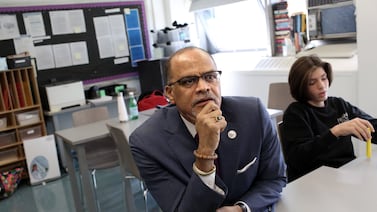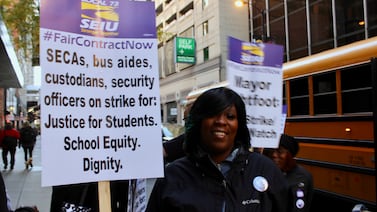Michigan teachers unions are backing a Democratic plan that would help labor groups in the state generate more resources for their collective bargaining efforts, even though the plan wouldn’t involve public school educators or other government employees.
At issue is a 2012 state law that freed workers at unionized workplaces who decline to join the union from having to pay a portion of dues — known as “agency fees” — to support the work that unions do on their behalf, such as negotiating wages and benefits. The law, which supporters refer to as a “right to work” policy, sparked fierce debate and spirited protests that drew national attention when it was passed in a state that has long been a stronghold for organized labor.
Democrats and their allies in the labor movement have long opposed the law. And now that they control the state Legislature and the governor’s office, Democrats have put the issue at the top of their agenda, making repeal bills the first legislation introduced this legislative session: One has been introduced in the House, and another in the Senate.
But neither bill would apply to public school teachers and their labor unions. That’s because of a 2018 U.S. Supreme Court ruling that says public employees who opt not to join a union cannot be required to pay agency fees.
Still, teachers unions are joining the fight against a law that opponents say strengthens private industry and employers at the expense of organized labor.
“Right to Work is an attack on working folk and all of organized labor,” said David Hecker, president of Michigan’s branch of the American Federation of Teachers.
Union leaders also want to be prepared if the Supreme Court reconsiders its 2018 decision in Janus v. AFSCME, which established the exception for public employees. Reversals are rare but not unprecedented. Just last year, the high court overturned its 1973 decision in the abortion case Roe v. Wade.
“It’s important to us that we already have state laws in place so if the Supreme Court does reconsider Janus down the road we have laws on the books (in Michigan) that allow workers to have their rights,” said Thomas Morgan, spokesman for the Michigan Education Association, the state’s largest teachers’ union.
“People who don’t join a union should still pay their fair share for the cost of representation,” he said. “Negotiating the contract and all the things unions do are not free.”
Conservatives warn that repealing the law would discourage employers from coming to Michigan or staying here.
The right-leaning Mackinac Center for Public Policy supports the right-to-work law and says there’s good reason for keeping the policy in place for government employees in particular.
Labor unions have political arms that influence public policies set by their members’ employers, said Patrick Wright, a labor attorney and vice president of legal affairs for the Mackinac Center, which advocates for free-market principles.
MEA spent $3.8 million on lobbying and political activities last year according to Department of Labor filings. That’s about 4.5% of its $84.2 million in revenue.
Those figures don’t tell the whole story, Wright said. Public-sector unions are intrinsically political, he said, and employees shouldn’t be required to support unions if they don’t want to.
“Maybe you disagree with what the union spends its money on. Maybe you don’t like their abortion stance, their gun stance, their whatever else stance,” he said. “There are so many things that unions get their fingers in.”
Michigan State University researcher Katharine Strunk, who has studied teachers’ unions and collective bargaining for decades, warned in 2018 that the Janus ruling would reduce union membership and revenue, and diminish bargaining power.
“When unions no longer have the ability to require people to pay union dues, it does seem to drastically reduce membership, because why would you pay for something you could free-ride on?” Strunk said in an interview this week. Her labor research is separate from her work as director of the Education Policy Innovation Collaborative.
In the 10 years since the right-to-work law took effect, MEA’s membership decreased from 151,771 to 117,994, according to U.S. Labor Department filings. Its revenue dropped from $122 million to $84.2 million over that period, filings show.
It’s not possible to know how much of that decline resulted directly from the law. MEA attributes some of the decline to declining enrollment and a shortage of teachers that was exacerbated by the pandemic.
Tracie Mauriello covers state education policy for Chalkbeat Detroit and Bridge Michigan. Reach her at tmauriello@chalkbeat.org.








